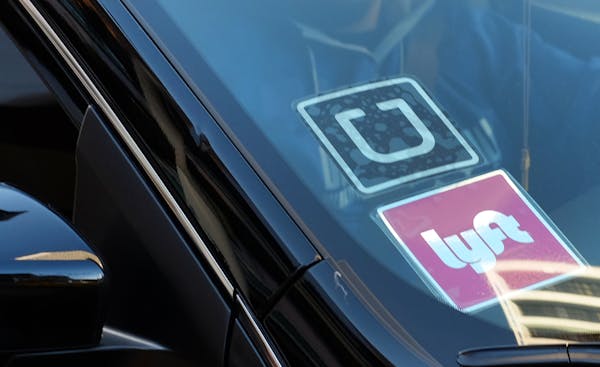Uber is notifying drivers in Minnesota that it will close its only Twin Cities service center in less than a month, a concrete step toward its pledge to pull out of the metro area entirely over a pay dispute with the Minneapolis City Council.
The letter to drivers from the San Francisco-based rideshare company's head of Mobility Operations in the U.S. and Canada says Uber will close its Greenlight Hub in Minneapolis on April 15. That will leave drivers with nowhere in the city to get face-to-face help with renewing documents, getting vehicles approved and inspected, or resolving other issues.
The letter, to be sent this week, also reaffirms the company's intention to exit the market and stop service at the Minneapolis-St. Paul International Airport on May 1, the day the new regulations go into effect.
Both Uber and the other major rideshare company, Lyft, are pulling out in response to last week's vote by the Minneapolis City Council to raise pay for rideshare drivers. Uber has gone further, saying it plans to leave the Twin Cities entirely.
"We know that this decision will have a huge negative effect on the Twin Cities," Uber executive Camiel Irving wrote in the letter. "It will put thousands of drivers — like you — out of work. And it will strand people looking to get to the office, to school, or back home safely after a night out."
Uber driver Howard Snitzer of Kenyon, Minn., said the Greenlight Hub is "helpful when you need somebody." He just visited the tiny office at 60th Street and Lyndale Avenue S. on Tuesday, he said.
Snitzer, who says he has made "great money" driving for Uber and Lyft full time for the past five years, said closing the hub might be Uber's way of negotiating and applying pressure on Minneapolis to roll back the driver pay ordinance. And in fact, some on the council may be considering a move to reconsider the vote.
"The City Council does not need to be in the middle of my business," said Snitzer, who said he pays his mortgage and expenses and can afford a vacation with what he makes driving. "They did not speak to enough players. They have no business representing me. I hope Governor Walz will step in and fix this."
Republicans and Democrats at the State Capitol have introduced a series of bills that aim to give the state control over rideshare regulations.
"This wasn't a decision we made lightly," Irving wrote, noting Uber trips in Minneapolis would be some of the most expensive in the nation under the new pay ordinance.
Uber driver David Ralls says he believes Uber is not bluffing.
"They have done it before," he said, noting the rideshare company left Austin, Texas, under similar circumstances. "The council is looking out for the little guy, but the real little guy in all this is the passenger."
Ralls, a Uber driver for the past seven years, said he spends a lot of time in Minneapolis and makes the equivalent of $30 per hour.
"I'm always busy," he said. "These drivers [who pushed for the pay raise] claim you can't make minimum wage. If they can't, they are doing it wrong, or not trying. There is no reason they can't make over minimum wage."
Irving wrote that Uber supports legislation that would ensure all drivers in Minnesota earn at least the minimum wage after expenses, and in the letter encouraged drivers to contact state lawmakers in support of legislation that, he wrote, "raises your fares, protects your flexibility, and keeps ridesharing affordable."

Want to share info with the Star Tribune? How to do it securely

'Safe recovery sites' would offer syringes, naloxone and more to people using drugs. The plan could be in peril.
New Minnesota GOP leaders seek peace with party's anti-establishment wing

Who is Republican Lisa Demuth, Minnesota's first House speaker of color?

